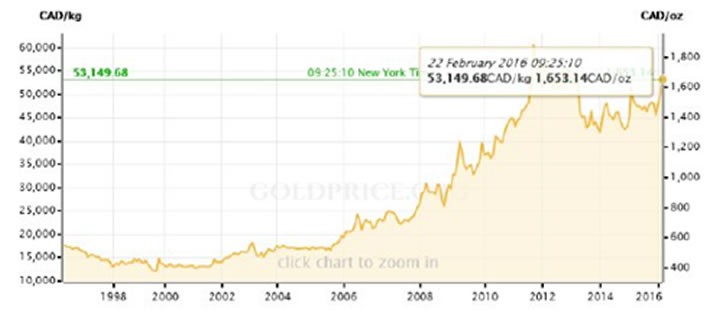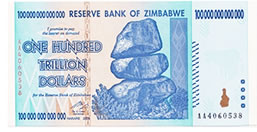Look What’s Happening to Gold Priced in OTHER Currencies [Wow…]
Commodities / Gold and Silver 2016 Feb 26, 2016 - 05:27 PM GMTBy: MoneyMetals
 At the close of market on the Wednesday this essay was written, the price of one troy ounce of gold was US$1,229. A troy ounce of silver was trading at US$15.25.
At the close of market on the Wednesday this essay was written, the price of one troy ounce of gold was US$1,229. A troy ounce of silver was trading at US$15.25.
Around the world, the price of gold and silver is most commonly quoted in U.S. dollars. As Americans, we tend to think this is the pricing "gold standard." But it's easy to forget that foreign investors generally pay for a purchase in their country's dominant currency.
Yes, there are realms whose domestic monetary unit is actually the U.S. dollar. These locales have what is known as a "dollarized" economy. But many, if not most, transact predominantly in their own currency.
In Argentina and Mexico, for example, it's the peso. In Great Britain, it's the Pound sterling. In most of Europe, it's the euro. In Russia, the ruble. In China, the yuan.
If the currency in question trades reasonably close to that of the dollar, there may not be a major difference. For example, on the day gold traded at US$1,229, a troy ounce was priced at about 1,102euros (€).
The Canadian Disadvantage
Just a few years ago, our Northern friends had a much easier go of it, when their currency, known affectionately as the Loonie, held for several months in the $1.10 area.
Today, the "Loonie" is only worth around $0.72 cents. Nowadays, the purchase of a troy ounce of gold will set Canadian investors back a cool C$1,678.

Consider that if a Canadian had bought gold in 2012, when his/her currency was worth US1.05, they would have paid about C1,540 per ounce, when an American was paying $1,600. Not bad, being able to purchase silver and gold at a 5% discount, eh?
Let's say that gold once again trades at US$1,600, and at that time, if the Canadian dollar is still stuck around $0.72, the hapless Canadian buyer will have to shell out C$2,080 for the same ounce.
Before Zimbabwe's epic inflationary spiral virtually destroyed its currency, the Zimbabwean dollar, it traded – believe it or not – at around US$1.27. In June, 2006, this worthless "paper promise" (a phrase which appears to have been coined some years ago by David Morgan at http://www.themorganreport.com/) was replaced by the Second Zimbabwe Dollar (ZWN) at a rate of 1,000:1. Then a third and fourth dollar were introduced.
 By the time it had declined to 10 x 25 ZWD (first dollars) that form of the currency was finally abandoned. The polite way of speaking about this abandonment is that it was "demonetized." The reality for Zimbabweans, is that they had been financially wiped out.
By the time it had declined to 10 x 25 ZWD (first dollars) that form of the currency was finally abandoned. The polite way of speaking about this abandonment is that it was "demonetized." The reality for Zimbabweans, is that they had been financially wiped out.
Interestingly, during this hyperinflationary phase – one of the worst on record – people panned for tiny flecks of gold in local, muddy streams in an attempt to earn enough money to buy food. Those who were old or infirm and who could not somehow pay younger people to pan for them... in effect faced starvation.
Imagine how different it would have been for these same people, had they held just one ounce of gold, or a tube of 20 one-ounce silver bullion rounds!
It's Even Worse for the UK and EU...
As a sidebar, gold in most other currencies has been looking very bullish on their charts for much of the last two years. Could the fact that we're accustomed to viewing the gold price in dollar terms (which made it look like a declining asset) account for the fact that so many people – including several well-known analysts of whom this writer is aware – missed the boat when the metals made what looks to be a major turn to the upside in late January?
A United Kingdom or European Union citizen will pay, in addition to the spot price and a premium, a Value-Added-Tax (VAT) – in the case of silver coins and bars, but not gold bullion – up to 20% of the purchase price. This means that, in addition to recouping the going premium and dealing with any $USD currency differentials, UK and EU customers must see silver rise a further 20% on certain silver purchases, in order to just break even.
Russia, Mexico and Argentina – Not Much Better
These three countries, in addition to experiencing a weakening exchange rate vis a vis the dollar, have been facing internal problems, such as high debt ratios, weakening economies, and capital flight, causing additional hammer blows to the value of the money they might have considered exchanging for gold and silver.
In late 2015, Argentina, long referred to disparagingly as "the place where money goes to die" finally elected a President who may be able to institute a sea-change in the way his country does business – if so, to the long-term benefit of just about all concerned.
When this writer visited Buenos Aires in 2007, the peso was trading at 2.5:1 US dollars.
In the spring of 2015, it was officially 10:1, but on the "blue dollar" street market, pesos could be had for 20:1. The restaurant where we ate would not accept credit cards (due to the uncertainty of what the exchange rate might be when charges were redeemed by the eatery). Not surprisingly, only cash was accepted.
Of course this, also encourages tax evasion, but could you blame them? Just another reason why an unstable currency breeds social discord and unethical conduct, in addition to robbing the holder of his/her purchasing power.
This year, one of the first actions that President Mauricio Macri took was to allow the peso to "float" – whereupon it immediately sank 25%. (Here again, holders of precious metals would have completely side-stepped this event – their purchasing power left intact.
Venezuela and North Korea... Fuggedaboutit!
Venezuela's inflation rate is running at over 700% (unreported for the last few months, for obvious reasons). A few years ago, North Korea devalued its currency by 95% – overnight.
Yes, gold is up $100 an ounce from its recent lows. Silver is up $1.40. For profit considerations, look at where it was in 2011, and where it's likely to go when, not if it breaks above those nominal high prices. For insurance considerations, the recent price increase should have no bearing on your decision to buy and hold precious metals, even if by some chance they make new lows in the process. As a Canadian would say, "no worries."
Just remember the old saw that you're holding for "insurance first; profit second. And while you're at it, pat yourself on the back for living in a country – where, in unlike a number of those mentioned above, you have a reliable source – such as Money Metals Exchange – from which to purchase your physical gold and silver.
By David Smith
David Smith is Senior Analyst for TheMorganReport.com and is a regular contributor to MoneyMetals.com. For the last 15 years, he has investigated precious metals mines and exploration sites in Argentina, Chile, Bolivia, Mexico, China, Canada, and the U.S. and shared his findings and investment wisdom with readers, radio listeners, and audiences at North American investment conferences.
© 2016 David Smith - All Rights Reserved
Disclaimer: The above is a matter of opinion provided for general information purposes only and is not intended as investment advice. Information and analysis above are derived from sources and utilising methods believed to be reliable, but we cannot accept responsibility for any losses you may incur as a result of this analysis. Individuals should consult with their personal financial advisors.
© 2005-2022 http://www.MarketOracle.co.uk - The Market Oracle is a FREE Daily Financial Markets Analysis & Forecasting online publication.



